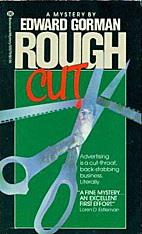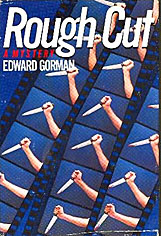Wed 16 Nov 2016
EDWARD GORMAN – Rough Cut. St. Martin’s Press, hardcover, 1985. Ballantine, paperback, August 1986.

The late Ed Gorman was such a towering figure in the world of mystery fiction, it came as a surprise when I realized that this, his first novel, was published only 30 years ago. If you’d have asked me, I’d have said that I’d known his name much, much longer than that. As a writer and editor and (for example) the first publisher of Mystery Scene, among other accomplishments, many of them behind the scenes, he was a man who will be missed.
And he was a writer with a distinctive edge, from the very first book. Most sources list Rough Cut as the first in his series of PI Jack Dwyer novels, but it is not so. There is a PI in this book, but it is a poor shnook named Harold Stokes, a nebbish kind of guy whose loyalty to a client is slimmer than a two dollar bill, viewed sideways.
No, the protagonist in Rough Cut is the head of an ad agency in the greater Chicago area named Michael Ketchum, whose partner is found stabbed in his own home. Gorman, being an adman himself before switching careers relatively late in life, obviously wrote his first book based on a world he knew full well.

Investigating on his own, and lying to the police about an alibi that isn’t so, Ketchum finds that his office had been filled with more than the usual small spats and petty hatreds: apparently everybody has been sleeping with everyone else, for example. Even the accountant’s secretary-mistress was cheating on him with someone else.
Or in other words, there is a dark-tinged noir feeling to Ketchum’s self-imposed attempt to identify the killer, hopefully not his company’s most affluent client, before the police do. It is incumbent on him to do so to protect the firm, to save the jobs of so many people, not to mention the support he has to provide to his two kids and to a father with Alzheimer’s. The weight of the world is on his shoulders, and in quiet desperation, he knows it.
This is a no-frills tale that’s tersely told, and is all the more effective for it — only 150 pages long in the paperback edition. A very good start, in my opinion, to a long and productive career — but not long enough.
November 16th, 2016 at 3:17 pm
Ed Gorman was an underrated writer. I haven’t read ROUGH CUT, yet, but you mention that it is incorrectly identified as part of his Jack Dwyer P.I. series on many internet sites. I wrote an introduction for the Stark House edition of Ed’s fine novels THE AUTUMN DEAD (Jack Dwyer) and THE NIGHT REMEMBERS (Jack Walsh) a few years ago. Several months after the book was released I noticed a website showing ROUGH CUT as a Jack Dwyer novel and had an anxiety attack thinking I missed one the titles in the intro I wrote. For a couple minutes I scolded myself for doing shoddy research, but thankfully I had been right the first time.
I posted the intro a few weeks ago at my blog. You may be of interest:http://gravetapping.blogspot.com/2016/04/reading-ed-gorman-dwyer-and-walsh-novels.html
Ben
November 16th, 2016 at 3:39 pm
Thanks for the link, Ben. I hadn’t read that intro to the Stark House book before, and you did a wonderful job with it. Lots of quotes and incisive statements about Ed’s writing. I especially liked this line:
“There is a bitter melancholy in much of Ed Gorman’s work and THE AUTUMN DEAD is no different. It is a narrative of loss and disappointment; the loss of time, the slow crawl to death, and the disappointment of failure.”
If I’d have thought of using the word “melancholy” when I wrote my review of ROUGH CUT, I would have used it.
November 17th, 2016 at 11:56 pm
From the start Ed had the authentic economy of words so perfect for the genre.
November 18th, 2016 at 10:00 am
Ed had been actively contributing to fanzines, at least, since the ’60s…easy enough to know him earlier…
November 18th, 2016 at 12:02 pm
That Ed was involved with either SF or mystery fandom long before he became a writer hadn’t occurred to me. Thanks for pointing that out, Todd.
November 18th, 2016 at 2:45 pm
Helluva fine debut. His distinctive voice comes through loud and clear right from the get-go.
November 18th, 2016 at 3:04 pm
Ed’s short article is reprinted in Dick and Pat Lupoff’s THE BEST OF XERO, just before Avram Davidson’s, both from about ’62…Ed Very young then….